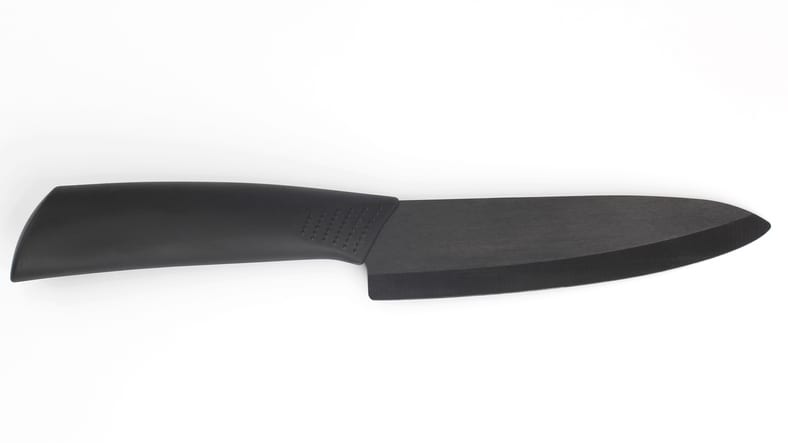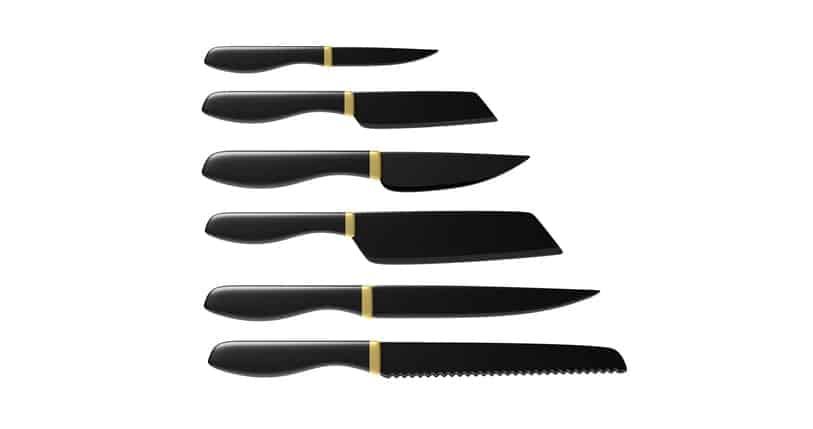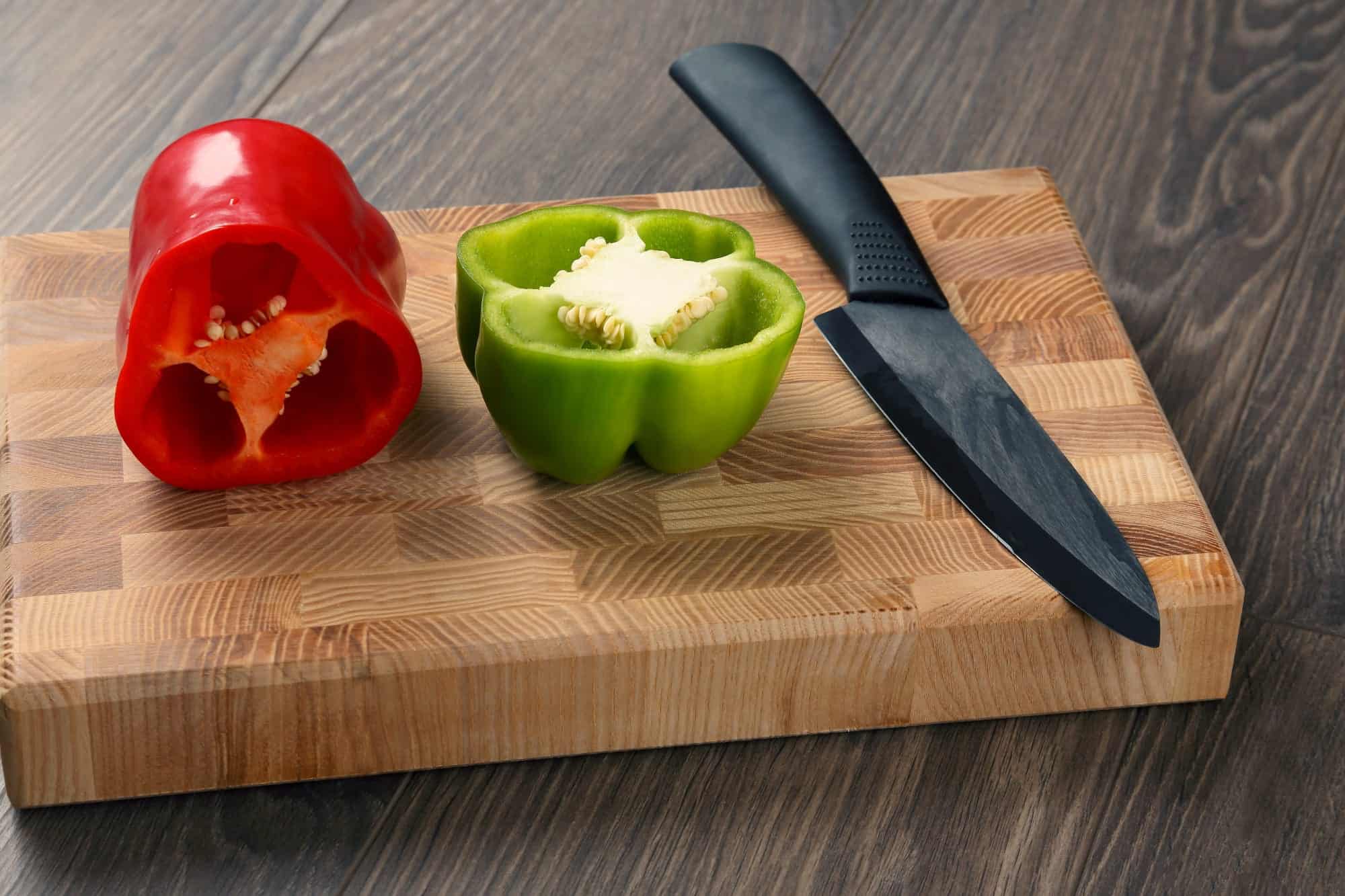Ceramic knives are becoming very trendy nowadays and for many good reasons. Now that we’re spending more time at home, we want to invest in the right tools for our day-to-day meal prep.
Are ceramic knives any good? Keep on reading to find everything you need to know.
What Ceramic Knives Are Made From
Yes, they are made of ceramic, but not the typical ceramic that plates or mugs are made of. This kind is recognized as “advanced ceramic” called zirconium dioxide, which can also be known as zirconia.
This kind of mineral is a lot tougher than titanium, steel, or any other metal that is used for knives. The only thing that is harder than zirconium dioxide are diamonds, which says a lot. With that simple fact, we already can name a few great benefits from owning ceramic knives.
Ceramic Knives and Their Benefits
They come in a wide variety of colors so yes, they are pretty to look at. Having colorful dishes in your kitchen brightens things up for sure. But that’s not the only thing they’re known for.

Durability
Thanks to zirconia, ceramic knives are much harder, which means they last a lot longer than a normal stainless steel knife, ten times longer. Another great bonus is that ceramic knives don’t rust, so that’s one less problem to worry about.
Doesn’t Require Sharpening
Sharpening knives require time and patience. When it comes to steel knives, sharpening is something you need to do consistently, unlike with ceramic knives.
Of course, just like any other knife, with time, a ceramic knife could chip or lose its sharpness. In that case, sharpening would require special services.
Easy to Clean
Technically, stainless steel knives aren’t difficult to clean either, but they do have the ability to absorb odors and transfer them. Ceramic knives don’t run that risk. They also don’t stain and are resistant to acids.
They’re Lightweight
Ceramic knives are very comfortable to handle thanks to their lightweight. They usually weigh half of what a steel knife weighs, which makes chopping and dicing a lot easier.
No Bacterial Growth
Stainless steel knives tend to have a lot more pores and can result in catching unwanted germs into your food and stomach. On the other hand, ceramic knives are non-porous, which means there’s no space for grimness or bacteria to accumulate on.
Not only does this mean that it keeps your food safe from harmful bacteria, but it also means that the food you slice will remain fresh for a longer amount of time than if you would’ve cut it with a steel knife.
Uses for Ceramic Knives
As amazing as ceramic knives are, they should not be a replacement for your chef knife. They can’t be used for everything, such as cutting bones, frozen goods, or anything just as hard – they are hard knives but brittle. Their material makes them delicate and attempting to cut a chicken bone, for example, could lead to them chipping or breaking.
Even certain vegetables such as carrots can cause your knife to break if you twist it the wrong way. In other words, ceramic knives should not handle the tough jobs.
However, when it comes to wanting more well-defined slicing or dicing, then ceramic knives are the better choice. Like slicing some fish, fruits, vegetables, or soft, boneless meats. They glide smoothly through these surfaces, giving you the thin slices you aimed for.
Sharpening Ceramic Knives
As mentioned above, ceramic knives don’t require sharpening. After a long time though, you may start to notice chips or nicks in your knife, especially if you’ve dropped it a few times.
Sharpening the ceramic knife or removing its nicks is a completely different and much more complex process than when it comes to removing the nicks on steel knives. Because it’s a difficult process, it’s always easier to take it to a professional. If you don’t have the time or money for that though, you can always try it at home as long as you keep these in mind.
The materials you use to sharpen your regular knives cannot be used on ceramic, as they can break – it’s recommended to use a diamond stone. It’s the safest thing to use on your knife, as the risk of it chipping even more runs low. It’s also the only thing that will sharpen the ceramic, as it’s harder than zirconia.
Something to bear in mind is that ceramic knives are brittle. Therefore, the strength you would use to sharpen a regular steel blade cannot be used on a ceramic knife. An ounce too much of strength and your knife can break – the same thing will happen if you don’t sharpen it from an accurate angle.
How to Care for Ceramic Knives
Because ceramic knives are more brittle, harder, and not as sturdy, they do require a different kind of care than steel knives. If you invest in buying a set of ceramic knives, you’re going to want to care for them properly so they can last a long time.
Store Them Properly
Storing them is highly important and should be done well. You want to prevent any kind of injuries happening to your knives, as the blades can chip with ease, especially the tips.
Look into getting a knife block or protective case made specifically for ceramic knives. If these aren’t available, then at least use a protective case for each blade.
Don’t leave them lying around either. Firstly, ceramic knives are very sharp and to leave them lying on the counter could be dangerous, as it can hurt someone. Secondly, you run the risk of having them fall to the floor – one drop to the floor and it could break.
Finally, don’t mix in your silverware with your ceramic knives. Ceramics could be exposed to possible damage if it’s alongside steel tableware.
Clean Them Well
Handwashing is the way you should go with ceramic knives, even when it comes to washing the tools you use to sharpen them. It’s recommended to not place them in the dishwasher.
Even though ceramic knives are tough, the pressure and harsh movements of the water can chip the knife. Not only that, but because it would be mixed in with all the other tableware, it runs an even higher risk of receiving some damage.
There’s also no need in using aggressive cleaning products for your ceramic knives. Food doesn’t stick to ceramic blades so usually, a simple rinse with warm water and soap is enough. Just make sure to not throw them about into the sink as this can cause them to chip.
Be sure to use a regular soft sponge for washing them as well. Anything too rough or abrasive can lead to possible damage.
Surfaces You Cut On
Cutting directly on glass or granite countertops can damage your knife. The surface should be soft and smooth, like a silicone cutting board. Also, using your knife to scrape off any leftover food from a plate or cutting board will damage the blade – avoid it at all costs.
This also includes using the knife as a can opener like we have the bad habit of doing. Smashing things with it, such as a clove of garlic, is a mistake as well. It will result in breaking your knife.

Choosing the Knife for You
It all depends on how much you cook and what you cook. If you just want to upgrade your knives for more effective preparation for your everyday meals, then ceramic knives might be the better choice. You know that you’ll be saving time on maintenance and you won’t have to worry about upgrading in a while.
Even if you just want to practice your cutting or improve your food arrangements to make them look presentable on a plate, ceramic knives will do the job.
If you’re wanting a knife that can do all kinds of work then, something that you can take over to the professional setting, you know ceramic knives might not be a good choice, as they’re inflexible, fragile, and limited to the kinds of things they can do.
Next Step
We all just want the right tools in our kitchen that adapt to our needs, whatever they may be. After looking into the benefits of owning ceramic knives, you might be concluding that they’re the right selection for you.
Are you still in doubt? Contact us today with any questions that you may have or leave a comment below!

